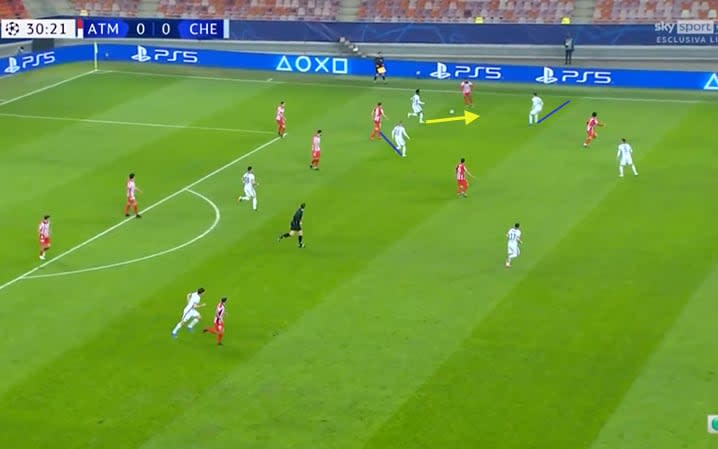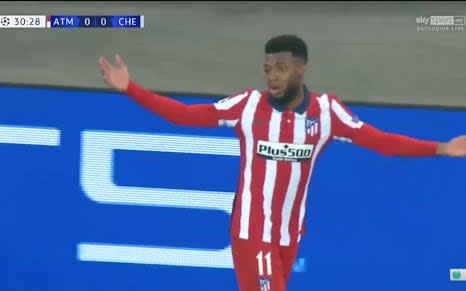The gegenpress derby: How Jurgen Klopp and Thomas Tuchel's philosophies diverged

- Oops!Something went wrong.Please try again later.
- Oops!Something went wrong.Please try again later.
Welcome to the Premier League’s ultimate gegenpress derby, Liverpool versus Chelsea now a fixture so hipster it can only be fully appreciated while sporting an untrimmed beard and swigging a cask ale.
It’s Jurgen Klopp versus Thomas Tuchel; it’s the coach mentored by Wolfgang Frank taking on the disciple of Ralf Rangnick; it’s the finest example of German pioneers penetrating the mainstream of English culture since Kraftwerk created electro-pop in the 1980s.
The nationality and career trajectories of Klopp and Tuchel means they will inevitably be categorised around the same footballing philosophies, as if all German coaches drop off an assembly line with their sports science degree, high-line defences and a penchant for touchline theatrics.
Both started their coaching career at Mainz before making the same direct trip to Borussia Dortmund, Tuchel considered the natural successor to Klopp in both instances.
Although the paths have diverged since, with Tuchel taking in the sights of Paris and now London, there is still a general sense of them following identical blueprints.

But rather than see the reflection of his teams in those of Tuchel, Klopp noted the differences before Thursday's Anfield meeting.
“When he arrived at Mainz he played different football to when we were there,” said the Liverpool coach.
“Thomas started playing a more possession-based game pretty early at Mainz, for example, which for us in the Bundesliga, with the resources we had, was not really possible.
“It was a different fight, a different generation. So he has a much better record than I ever had at Mainz. It’s not too easy to compare it, to be honest. He won more - many more - Bundesliga games than I ever won. That's true. But it was just different times.
"At Dortmund? Yeah, he (again) used to be more possession-based. I think that is the difference in organisation, maybe.”
When Klopp moved to England, as in the Bundesliga, Liverpool’s preferred style was generally full volume, and the emotional connection with his players and The Kop was as important as when conducting Dortmund’s Yellow Wall.

Tuchel has always been presented as more studious, less hands-on with his players, and not so blessed with the warmth and natural charisma of the man he replaced.
These were no doubt always incomplete, somewhat caricatured portrayals of multifaceted personalities. For sure, the variations which once appeared to more visibly and obviously separate the coaches are more subtle now.
As many noted in the two years preceding Liverpool’s Premier League success, Klopp has evolved, his team becoming more orchestral than heavy metal as the team’s technical quality has improved.
Last weekend, for example, Klopp dismantled the idea he has no ‘plan B’ by tactically tweaking his line-up. Typically it was geared toward improving his attack rather than sending his defensive line into retreat, giving Curtis Jones the freedom to get further upfield. Nevertheless, it showed how, in the midst of a poor run and enduring injury problems, Klopp is seeking fresh solutions to stay in the race for Champions League places rather than trying and failing with rigid ideas.
“It was about involving enough players in the creating situation and then the finishing situation,” Klopp explained.
“Keep the width and make sure we had enough players in between so we always were well protected.”
The Liverpool manager also agrees his strategy is more possession-based now than his earlier days.
“We changed in that department a lot so there is no massive difference philosophy wise (between himself and Tuchel) anymore I would say,” said Klopp.
"I would need to watch much more games of Thomas's teams to answer this question. I saw a few games of PSG (before Liverpool played them in the Champions League), and I saw three games at Chelsea early on and a few at Dortmund.
“We’ve known each other for a long time, he worked for Mainz as I did, he worked for Dortmund as I did. so a lot of people we know are the same. I think he is an outstanding coach or manager, whatever you want to call it, and it will be tricky to play his team, like it always was.”
It’s unlikely any previous Premier League game has been as eagerly monitored in Germany as Thursday’s, Klopp the greatest coaching export of his country’s generation against the manager eyeing that status.
“I don’t know how big it is in Germany, I didn’t read anything yet,” said Klopp.
“Who is the top manager in the Premier League? That is a competition for others to be interested in. I am interested in winning a game and that is all. Thomas is the same.”
Why Tuchel and Klopp aren't as similar as reputations suggest
Analysis by JJ Bull
Liverpool's setup will surprise nobody on Thursday evening. Klopp has built a 4-3-3 attacking machine which pushes high up the pitch, creates chances through relentless endeavour, and wants to pummel the opposition into submission. Once described by Klopp as "heavy metal football", the volume has been turned down slightly in the last couple of seasons to a more controlled version of Klopp's tactical preference.
A high press and intense counter-press remain fundamental to how Liverpool play, though as is the case across the league this season, there has been a drop in intensity compared to pre-pandemic times.
Klopp sticks to his preferred style of play no matter what. There are tweaks here and there, subtle adjustments made from game to game, and different players will naturally cause the system to function in slightly different ways, but Liverpool are a 4-3-3 and it's up to the opponent to figure out how to stop them.
In the blue corner on Thursday is Tuchel, a tactically dextrous manager who likes his teams to change shape and system mid-game. Where Klopp stuck rigidly to an attacking 4-2-3-1 or 4-3-3 at Dortmund, Tuchel utilised 4-2-3-1, 4-3-3, 4-1-4-1, 3-4-3, 3-1-4-2 and 3-4-1-2 formations with varying strategies attached to all. At PSG this portfolio was expanded to include 4-4-2, 4-2-2-2, and 3-5-2, with the team occasionally shifting fluidly between them during matches.
Tuchel's teams also press high up the pitch but don't rely upon that to create chances in the way Klopp's teams do. His early Mainz teams pressed intensely and were renowned for being difficult to play against, but with better players at Dortmund and PSG, he has focused more on controlling possession, dominating the ball, and drawing the opponent out with lots of passing.
Tuchel at Chelsea
That is what we have seen at Chelsea since Tuchel came in. Frank Lampard's side were disorganised defensively and extremely vulnerable to counter-attacks, while Tuchel's setup for the 1-0 over Atletico Madrid - one of the most dangerous teams in transition in Europe - was a perfect example of how to contain and control an extremely tricky opponent.
In that game, Chelsea didn't allow Atletico to escape their own defensive third, immediately closing down the man on the ball and blocking passing lanes in a full-court, man-to-man counter-press, keeping a 63 per cent share of possession.
Diego Simeone's side sat deep in a 6-3-1 for much of the game, blocking the final third until they won the ball, at which point they'd try to get up the pitch as quickly as possible. In this freeze-frame, Timo Werner (circled) has lost control of the ball and Atletico have the chance to execute one of these counters, but Chelsea are positioned to absorb the threat.

This safety net shape allows the players to then urgently press the counter.
Below, Callum Hudson-Odoi, who was substituted as a substitute for failing to carry out his defensive instructions in his previous match, immediately closes down Thomas Lemar on the Atletico left, running across to shut down the only available passing lane (yellow arrow), as Werner (blue line, left) gets tight to another option, and Mason Mount (blue line, right) prepares to step across and block the pass down the wing.

Lemar can't do anything with the ball and says so to his frustrated team-mates:

Tuchel shifted from the 3-4-3 he reintroduced at Chelsea to a 3-4-1-2 in this match, and both are shapes that Lampard also utilised during his time in charge. The difference in defensive organisation in Lampard's versions of these systems compared to Tuchel's is huge.
PPDA, a measure of pressing intensity, shows that Chelsea have increased their pressing numbers under Tuchel, playing a higher defensive line and allowing the opposition fewer passes before winning the ball back:

Chelsea have far more control of matches than they did under Lampard with a clear focus on defensive stability resulting in fewer shots conceded, fewer goals conceded, and a higher share of possession too.

Lampard's attacking strategy was to overwhelm the opponent, similar in theory but not execution to Klopp's Liverpool, creating chaos and overloads in the final third. Tuchel's Chelsea are much more measured and organised. They are also a lot more predictable, which might explain the lower goals scored per match, albeit from a small sample size of games.
Liverpool are defensively weak at the moment and there is every chance that Tuchel adjusts the way his team progresses play with training sessions designed to encourage more direct passes into spaces, in a less Sarri-ball and slightly more Lampard-like approach - but this is what separates him from Klopp. Tuchel adapts and adjusts depending on his opponent and the tactical demands of the match. There are no guarantees as to how his teams will line up and what the strategy will be depending on the selected XI.
Liverpool's tactics are predictable on paper but on the pitch they work and have blown most teams out of the sky. Naturally, the application of Klopp's football is difficult with the first XI's balance offset by injuries to so many key players, and opponents able to sit even deeper after profiting from a defensive error. Without momentum, heavy metal football can get a little repetitive. If Liverpool are soundtracked by Rammstein, Chelsea are a mixtape.
Both managers hold great respect for each other, with Klopp stating part of the reason he left Dortmund when he did was to ensure the club were able to hire Tuchel before he was signed up by another club:
Tuchel has been similarly effusive in praise for Klopp but doesn't appear to enjoy the idea that he lives in his shadow.
“I’m so happy that Kloppo has finally made up his mind,” he joked when asked about Klopp moving to Liverpool in 2015. “Now I know where I’ll be going next as a coach.”
Christian Heidel, once the managing director at Mainz, has said in past that Tuchel actively dislikes the comparison but the Chelsea manager is right to reject it - he and Klopp are entirely different people and personalities who win football games with their own unique methods.
“Jurgen is one of the best coaches, one of the most fascinating personalities and a super, funny guy," Tuchel said in an interview a week after he was appointed Chelsea manager.
“Of course, we have a certain history. But I was at Mainz after him. We don’t know each other as well as everybody thinks.”

